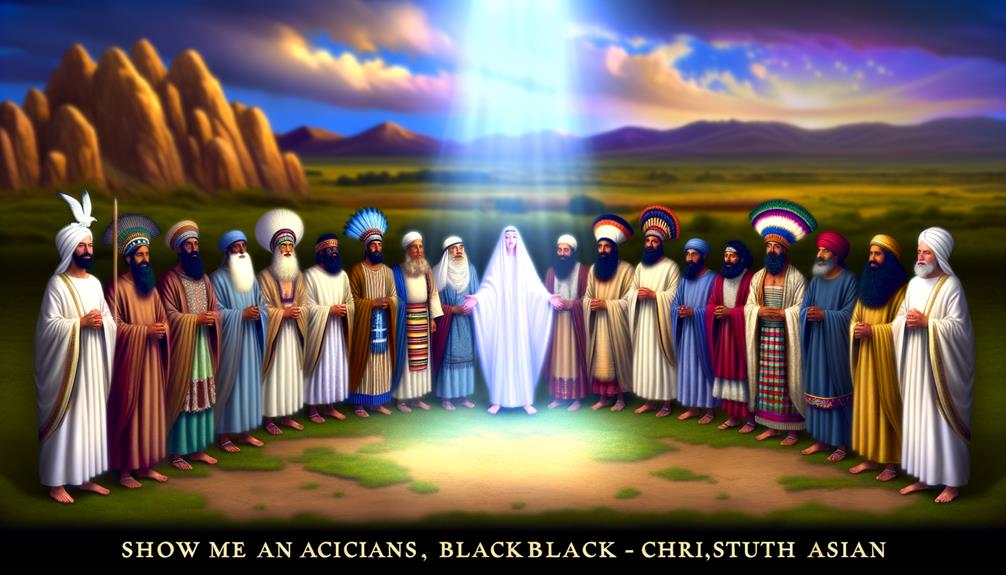Symbolic Meaning of Number 9 in the Bible: Judgment
In biblical symbolism, the number 9 signifies divine completeness, finality, and judgment. It encapsulates the nine fruits of the Holy Spirit outlined in Galatians 5:22-23, which illustrate the transformative sanctification of believers.
Additionally, it resonates with the nine Beatitudes in the Sermon on the Mount, essential to Christian ethical teachings. The number 9 also marks the pivotal nine hours of Christ’s crucifixion, fulfilling divine prophecies.
Historically, it includes the nine plagues of Egypt, symbolizing God’s sovereignty, and mirrors spiritual endowments through the nine gifts of the Spirit. To fully appreciate its depth, consider its broader theological implications.

Symbolic Meaning of Number 9 in the Bible: Divine Completeness, Spiritual Growth, and Finality
| Aspect | Biblical Meaning |
|---|---|
| Divine Completeness & Finality | The number 9 symbolizes divine completeness and finality. It often represents the conclusion of a matter, marking the end of a cycle or a phase (Galatians 5:22-23). |
| Fruits of the Spirit | There are nine fruits of the Spirit listed in Galatians, including love, joy, peace, and patience, which reflect spiritual maturity and godly character (Galatians 5:22-23). |
| Judgment & Finality | The number 9 can also signify judgment, as it is often associated with the finality of God’s decisions, such as the nine judgments of Egypt before the Exodus (Exodus 7-11). |
| Prayer & Intercession | In the Bible, 9 is linked to the concept of prayer, as Jesus died in the ninth hour (3 PM), the same hour associated with prayer and sacrifice, symbolizing ultimate intercession (Matthew 27:46). |
| Spiritual Growth & Harvest | The number 9 suggests spiritual growth, maturity, and the harvest of good deeds. It is a reminder to cultivate the fruits of the Spirit and live a life of spiritual abundance (John 15:8). |
Nine Fruits of the Holy Spirit

Reflecting the transformative influence of divine grace, the nine fruits of the Holy Spirit, as enumerated in Galatians 5:22-23, encapsulate the virtues that believers are encouraged to cultivate in their spiritual journey.
These fruits—love, joy, peace, patience, kindness, goodness, faithfulness, gentleness, and self-control—serve as hallmarks of a life imbued with the Spirit.
Theologically, these virtues are not mere moral aspirations but manifestations of God’s sanctifying power within the believer.
Scriptural analysis reveals their interconnectedness, portraying a holistic transformation of character.
Historically, the early Church Fathers emphasized these fruits as evidence of true discipleship, shaping Christian ethics and communal life.
Consequently, the nine fruits symbolize the fullness of spiritual maturity and divine alignment.
Nine Beatitudes

In a similar vein to the nine fruits of the Holy Spirit, the nine Beatitudes presented in the Sermon on the Mount (Matthew 5:3-12) encapsulate profound spiritual principles that guide believers toward a blessed and righteous life.
Each Beatitude offers a divine promise in response to a specific attitude or condition of the heart, reflecting both the ethical and eschatological dimensions of Jesus’ teachings. Historically, these pronouncements have shaped Christian ethical frameworks and deepened theological reflections on the nature of true blessedness.
- Blessed are the poor in spirit: for theirs is the kingdom of heaven.
- Blessed are those who mourn: for they shall be comforted.
- Blessed are the meek: for they shall inherit the earth.
Nine Hours of Christ’s Crucifixion

The nine hours of Christ’s crucifixion, spanning from His condemnation to His final breath, hold profound theological significance and are meticulously chronicled in the Gospels.
Beginning at the third hour (9 a.m.) with His condemnation by Pontius Pilate, the events unfold with harrowing precision. By the sixth hour (noon), darkness envelops the land, symbolizing the weight of humanity’s sin.
At the ninth hour (3 p.m.), Jesus utters His final words, ‘It is finished,’ signifying the completion of His redemptive work. This period encapsulates the fulfillment of Old scripture prophecies and the embodiment of divine grace.
The nine hours reflect a divine timetable, underscoring the intersection of temporal suffering and eternal salvation in Christian theology.
Nine Tribes of Israel

Among the twelve tribes of Israel, nine played pivotal roles in the unfolding narrative of the Old Scriptures, each contributing uniquely to the spiritual and historical tapestry of the Israelite nation.
These tribes not only populated the Promised Land but also shaped the religious and cultural ethos of the Israelites. Their significance is underscored through various scriptural references and historical events.
- Judah: The tribe from which King David and ultimately Jesus descended, symbolizing leadership and messianic prophecy.
- Levi: Entrusted with priestly duties, representing spiritual leadership and religious purity.
- Ephraim: Known for its prominence in the Northern Kingdom, embodying strength and resilience.
These tribes collectively enriched Israel’s heritage.
Nine Plagues in Egypt
The nine plagues in Egypt serve as a profound example of divine judgment and mercy within the biblical narrative, highlighting God’s sovereignty and the moral imperatives placed upon humanity.
Scripturally, these plagues symbolize a series of escalating consequences intended to compel Pharaoh to release the Israelites, reflecting deeper theological themes of liberation and covenant.
Historically, this sequence underscores the severity of resistance against divine will and the ultimate triumph of God’s purpose for His chosen people.
Significance of Nine Plagues
In the narrative of the Exodus, the nine plagues that befell Egypt serve as a profound manifestation of divine judgment and a pivotal demonstration of Yahweh’s supremacy over the Egyptian gods. Each plague systematically dismantled the perceived power of these deities and exposed their impotence.
Theologically, the plagues can be seen as a structured assault on the polytheistic beliefs of Egypt, highlighting Yahweh’s unparalleled authority.
Key points to reflect upon include:
- Water turning to blood: Nullifying the Nile god, Hapi.
- Frogs: Challenging the fertility goddess, Heket.
- Darkness: Discrediting the sun god, Ra.
Through these plagues, the scriptural narrative emphasizes a divine orchestration aimed at liberating the Israelites.
Biblical Symbolism Explained
Examining the theological implications of the nine plagues in Egypt reveals a profound layer of symbolic meaning embedded within the biblical narrative.
Each plague, as described in the Book of Exodus, serves as a divine judgment against the gods of Egypt, demonstrating Yahweh’s supremacy.
The ninth plague, darkness, symbolizes the ultimate defeat and nullification of Ra, the sun god, indicating a climactic theological statement.
Historically, the plagues reflect the cosmic struggle between divine will and human obstinacy, embodying themes of liberation and divine justice.
Scripturally, the sequential escalation of plagues underscores the persistence of divine mercy despite Pharaoh’s hardened heart, revealing a God who is both just and patient.
This rich symbolism enhances our understanding of God’s character and purpose.
Nine Gifts of the Spirit

The nine gifts of the Spirit, as elucidated in 1 Corinthians 12:8-10, encompass a range of divine endowments bestowed upon believers to edify the church and manifest God’s power.
Each gift—ranging from wisdom to prophecy—serves a distinct purpose, enriching the spiritual fabric of the Christian community and reflecting the multifaceted nature of God’s grace.
This examination will provide a thorough overview of these spiritual gifts, supported by pertinent biblical references and historical context.
Spiritual Gifts Explained
Among the various spiritual gifts detailed in 1 Corinthians 12, nine are distinctly highlighted as manifestations of the Holy Spirit’s work within the Christian community.
These gifts are bestowed to edify and unite believers, illuminating the divine presence in their midst.
The nine gifts encompass:
- Wisdom: Offering divine insight and guidance.
- Knowledge: Providing a deeper understanding of spiritual truths.
- Faith: Empowering believers with unwavering trust in God.
Each gift serves a unique purpose, contributing to the holistic growth of the Church.
The historical and theological significance of these gifts underscores their role in fostering a vibrant, spiritually enriched community, reflective of God’s grace and sovereignty.
Biblical References Overview
Scriptural exegesis of 1 Corinthians 12 reveals a foundational understanding of the nine spiritual gifts, each intricately woven into the fabric of early Christian theology and practice.
These gifts—wisdom, knowledge, faith, healing, miraculous powers, prophecy, distinguishing between spirits, speaking in tongues, and interpretation of tongues—reflect the manifold expressions of the Holy Spirit’s work within the early Church.
Historically, these gifts served not only to edify the community but also to authenticate the nascent Christian faith amidst a diverse religious landscape.
Paul’s delineation underscores the unity and diversity of these gifts, emphasizing that they are bestowed by one Spirit for the common good.
This theological framework continues to inform contemporary ecclesiastical discourse and praxis.
Conclusion
The number nine in the Bible serves as a cornerstone of divine symbolism, transcending mere numerology to embody spiritual completeness and divine will. The number nine is associated with various significant events in the Bible, such as the nine fruits of the Holy Spirit and the nine gifts of the Holy Spirit. In biblical numerology, the number nine is often seen as representing the meaning of numbers and their spiritual significance. This symbolism goes beyond just simple arithmetic, pointing towards the deeper spiritual truths and the interconnectedness of all things within the divine plan.
From the Nine Fruits of the Holy Spirit to the Nine Beatitudes, and the profound significance of Christ’s nine-hour crucifixion, the number nine holds an unparalleled sanctity.
Its pervasive presence in scriptural texts—encompassing tribes, plagues, and spiritual gifts—undeniably underscores its role in the cosmic narrative of faith and redemption, almost as if it were the heartbeat of divine intention itself.






